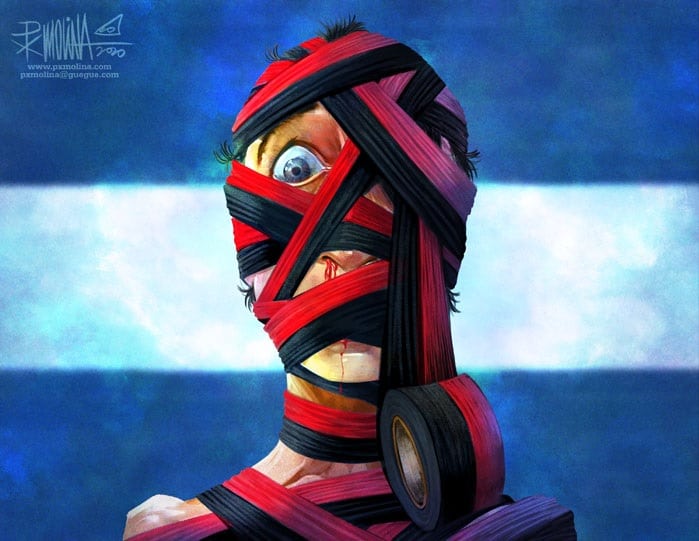25 de octubre 2020

Children of Exile: The Births “Sowing Hope” in the Camp of Nicaraguan Farmers

PUBLICIDAD 1M
PUBLICIDAD 4D
PUBLICIDAD 5D
Special Cybercrimes Law aimed at “erasing” the April Rebellion. At the same time, it orders internet providers to “record” user data.

Three FSLN dominated commissions have now ruled in favor of the Ortega- Murillo regime’s proposed Special Cybercrimes Law. The law will obligate internet service providers to “record” user data and release this information to the regime. That’s the conclusion of attorneys and deputies, whose analyses are circulating since October 23.
The Ortega-allied deputies approved the draft of the Special Cybercrimes Law on October 21. Now that the commissions have ruled in favor, the law will go before the Nicaraguan National Assembly.
The law gives the regime’s judges the power to “order” internet and tech services to release data to the government. They can mandate internet providers to “collect, extract or record user data, as well as real time data traffic.”
Article 39, item 10 of the law establishes these measures, plus others that the regime can apply discretionally. The regime can order an internet provider to turn over “user data they may have in their possession or control.”
In addition, the regime gives the judges power over any person with knowledge of information systems. They can force such experts to “provide the information for carrying out necessary investigations.”
As part of their ruling, the regime’s deputies defined information and communication technologies. These comprise any device or application that, “allows the capture, production, reproduction, transmission, storage, processing, treatment and presentation of information.” This can be “in the form of images, voice, texts, codes, or data.”
In other words, any device, be it a cellphone, a computer or a tablet, is included. Its data could be used for “investigations”. The law doesn’t specify any reason or rationale needed for such investigations.
Beyond the power to demand information from local companies, Article 44 includes the ability to request assistance from other governments.
The Ortega regime’s proposal establishes criminal penalties for those who elevate the image of the political prisoners. In addition, it criminalizes citizens who make fun of Ortega, and media that publish information leaked by public employees. It further establishes that no personality recognized for their actions in the April Rebellion can be portrayed as a hero.
Article 29 reads: “Whoever makes use of the information and communication technologies to incite, instigate, provoke or promote the commission of crimes, or who extols or elevates its author or participants or takes credit for it, can receive a sentence of 3 – 5 years in prison plus fines.”
Attorney Jose Pallais is an opposition member and former president of the National Assembly’s Justice and Legal Affairs Commission. He warns that this article is “grim”. The regime already considers all those who participated in the April Rebellion “criminals or terrorists”. The law now establishes that they cannot be portrayed as heroes or leaders.
Pallais offered some other interpretations of the law. “To the regime, the political prisoners have committed crimes. Hence, anyone who questions the imprisonment of a political prisoner is subject to these barbarities. This is also directed at anyone who promotes resistance against the regime. Another thing that they could consider a crime is a roadblock.”
The Ortega commissions left intact Article 30 of the draft. This prescribes two to four years in prison, plus hefty fines for anyone who “publishes or spreads false or distorted information. It also applies to information “which could produce alarm, fear or anxiety in the population.”
There’s a sanction for “false or distorted” information that harms the honor, prestige or reputation of a person or family. Whoever spreads information so construed will receive a sentence of one to three years.
The third paragraph of the same article targets information that “incites hate or violence”. It extends to information that endangers economic stability, public order, public health or national security. The person doing this would receive three to five years in prison and a large fine.
However, the regime typically defines false news as anything that questions or opposes its political interests. As such, dissidents, analysts, and the independent media are alarmed. They warn that any kind of information that doesn’t please the regime will be penalized as “fake news”.
The draft of the law levies sentences of two to four years in prison for a series of very vague personal offenses. There are sanctions for “imputations against [someone’s] honor or prestige”. Also prohibited and criminalized: “divulging secrets harmful to a person, his family, or other persons with whom they’re related.” The same applies to divulging harmful secrets about “an entity they represent of have interests in.”
Although this could appear to be protection against slander, Liberal party deputy Azucena Castillo feels otherwise. She believes that this too is a direct threat to the country’s communications media. It also threatens citizens who make fun of the regime’s functionaries on social media.
“They want to put a lid on everything, so that no one can say anything. Then, they can reign as they want,” said Castillo. She emphasized: “there’s great leeway in how these laws will be implemented “against a determined person.”
Article 26 also criminalizes any leaks of information that the regime considers private. It establishes three to six years in prison for anyone who “without the consent of the information’s owner… reveals, spreads, or totally or partially releases said information. This could involve “images, video, texts, audio or other things.”
Given the Ortega supermajority in the National Assembly, it’s expected that the law will be rapidly approved next week.
Archivado como:
PUBLICIDAD 3M
PUBLICIDAD 3D